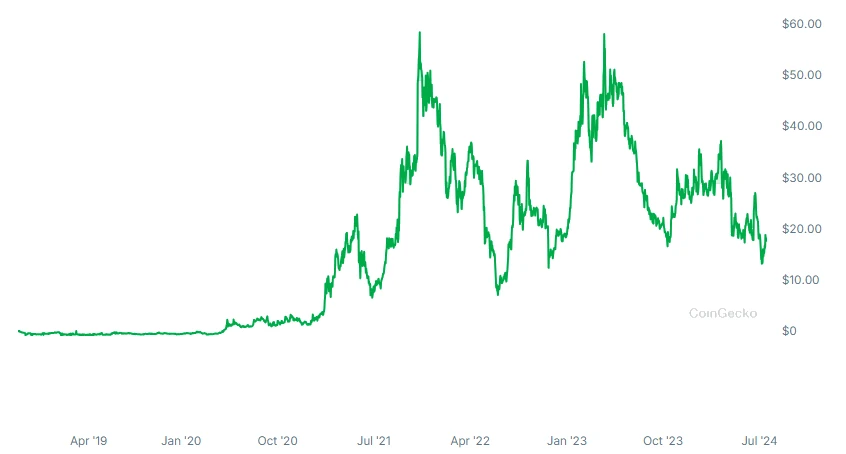Introduction
In fact, Ethereum is a leading platform for decentralized applications and smart contracts. As Ethereum continues to grow, the concept of staking has become increasingly important. One of the most exciting developments in the world of Ethereum staking is Rocket Pool.
Today article is in all dedicated to Rocket Pool platform, decentralized staking, comparing to traditional staking and a few things more.
Just read it and enjoy it. By the way, as like always, hopefully!
What is Rocket Pool?

Rocket Pool is a decentralized Ethereum staking platform that allows users to participate in the process of securing the Ethereum network and earning rewards.
Unlike traditional staking, which requires users to have a minimum amount of Ether (ETH) to stake, Rocket Pool allows users to pool their Ether, regardless of the amount, and earn staking rewards.
The platform works by creating a network of “Rocket Nodes” that manage the staking process. These nodes are responsible for validating transactions and maintaining the security of the network.
Users can deposit their Ether into the project and receive a token called Rocket Pool token (RPL) in return. This token represents their stake in the network and allows them to earn staking rewards.
Benefits of Decentralized Ethereum Staking
Decentralized Ethereum staking offers several benefits over traditional staking methods.
Firstly, it allows users to participate in the staking process without having to meet the minimum staking requirements. This opens up staking opportunities to a much wider audience and promotes a more inclusive and decentralized network.
Secondly, decentralized staking platforms like this one provide an additional layer of security to the Ethereum network. By distributing the staking process across multiple Rocket Nodes, the network becomes more resilient to attacks and less prone to centralization.
Another key benefit of decentralized Ethereum staking is the ability to earn rewards. Users who stake their Ether through Rocket Pool have the opportunity to earn staking rewards in the form of additional Ether. These rewards are distributed based on the user’s stake and the performance of the network.
The Rocket Pool Token (RPL)

The token (RPL) is an integral part of the Rocket Pool ecosystem. It serves multiple purposes, including representing the user’s stake in the network and providing access to various features and benefits.
One of the main functions of the RPL token is to act as a form of collateral. Users who wish to participate in the staking process must hold a certain amount of RPL tokens. This ensures that users have a vested interest in the success of the network and helps to prevent malicious behaviour.
Additionally, the RPL token can be used to vote on governance proposals within the project ecosystem. This allows users to have a say in the development and direction of the platform, further promoting decentralization and community involvement.
The Rocket Pool Token Price in Depth

2 bear markets, one full bull market and there is a lot to analyse. As you probably already know, this is not a standard in the cryptocurrency world. Here I go!
1st Bear Market
The price starts at $1 per unit. Relatively cheap.
At the end of the year, the price reaches a minimum low of $0.04 per unit.
Until March 2020, the price is in a sideways trend. Similarly with the rest of the entire cryptocurrency market.
Well, okay, I should write Bitcoin in particular.
Oh wait, let me go back to the local bottom from $1 to $0.04 per unit in just a year. A big fall!
1st Bull Market
In fact, since March we can already write about a boom in this token.
Let me remind you that in March 2020 the price was about USD 0.3 per unit.
In May 2021, this price is already $22.
However, this is not the end of the bull market.
After correction – price at $8 at the local bottom.
The price rebounds to ATH of $61.90 per unit. How many times more is that?
2nd Bear Market
The bear market lasted about 8 to 9 months. After which the price reached a local bottom at nearly $9 per unit. From a peak of $60 to a bottom of $9 in nearly 8 months. The loss is significant, but it is nothing unusual on the cryptocurrency market.
2nd Bull Market
Since mid-2022, the price has basically been in an upward trend. In fact, there are moments of a mini bull market, such as in mid-2023, when the price reached its ATH of $61! Then there was a correction and a recovery for almost a week.
How to Get Started with Rocket Pool
Getting started with this project is a straightforward process.
Follow below process to make this happen.
Set up an Ethereum Wallet
Before you can start using Rocket Pool, you’ll need to have an Ethereum wallet that supports ERC-20 tokens. Popular options include MetaMask and MyEtherWallet.
Acquire Ether (ETH)
In order to participate in the staking process, you’ll need to have some Ether. You can acquire Ether through various exchanges or by receiving it from others.
Deposit Ether into Rocket Pool
Once you have Ether, you can deposit it into the Rocket Pool platform. This will allow you to receive RPL tokens and start earning staking rewards.
Stake your RPL Tokens
After receiving RPL tokens, you can stake them to become a validator in the Rocket Pool network. This will involve running a Rocket Node and contributing to the security and operation of the Ethereum network.
The Future Potential of Rocket Pool

As Ethereum continues to grow and evolve, the potential for this project is immense. The platform has the ability to revolutionize the staking process by making it more accessible, secure, and rewarding for users.
One of the key areas where Rocket Pool has the potential to make a significant impact is in the area of scalability.
As the Ethereum network becomes more congested, the need for scalable solutions becomes increasingly important. Rocket Pool’s decentralized staking model can help alleviate some of the scalability challenges by distributing the staking process across multiple nodes.
Another area where Rocket Pool has the potential to shine is in the realm of decentralization. By allowing users to pool their Ether and participate in the staking process, project promotes a more inclusive and decentralized network.
This can help prevent centralization and ensure the long-term sustainability of the Ethereum network.
Rocket Pool vs Traditional Ethereum Staking
When comparing Rocket Pool to traditional Ethereum staking, several key differences and advantages emerge.
One of the main advantages of Rocket Pool is its ability to remove the minimum staking requirement. This means that users who do not have enough Ether to meet the minimum requirement can still participate in the staking process through Rocket Pool.
Another advantage of Rocket Pool is its decentralized nature.
Traditional staking often involves relying on a single validator or a small group of validators. This can lead to centralization and increased vulnerability to attacks. Rocket Pool, on the other hand, distributes the staking process across multiple nodes, making the network more resilient and secure.
Furthermore, Rocket Pool offers additional benefits such as the ability to earn rewards and participate in governance.
These features provide users with more incentives to participate in the staking process and contribute to the overall success of the network.
Common Challenges and Risks of Rocket Pool

While Rocket Pool offers many advantages, it’s important to be aware of the potential challenges and risks associated with using the platform.
One of the main challenges is the need for users to have a certain amount of RPL tokens to participate in the staking process. Acquiring these tokens may require additional investment and can be a barrier for some users.
Another challenge is the need to run a Rocket Node in order to stake RPL tokens. This requires technical expertise and the ability to maintain a reliable and secure node. Users who are not familiar with running nodes may face challenges in setting up and maintaining their Rocket Node.
In terms of risks, one of the main concerns is the potential for slashing.
Slashing refers to the reduction or loss of staked funds as a result of malicious behaviour or network failures. While Rocket Pool implements various measures to mitigate the risk of slashing, it’s important for users to be aware of the potential risks and take necessary precautions.
Communities for Rocket Pool Users

As Rocket Pool continues to gain popularity, there are several resources and communities available for users to learn more and engage with the platform. Here are a few key resources to get you started:
Official website
The official website provides detailed information about the platform, its features, and how to get started.
Documentation
The documentation provides in-depth technical information about the platform, including how to set up and run a Rocket Node.
Community Forums
The community forums allow users to connect with each other, ask questions, and share experiences.
Social Media Channels
Rocket Pool maintains active social media channels where users can stay updated on the latest news and announcements.
Conclusion
Rocket Pool is an exciting and innovative platform that has the potential to revolutionize the world of decentralized Ethereum staking. By removing barriers to entry and promoting decentralization, Rocket Pool opens up staking opportunities to a wider audience and helps ensure the long-term success of the Ethereum network.
In future the need for scalable and secure staking solutions becomes increasingly important. Rocket Pool addresses these needs by distributing the staking process across multiple nodes and providing users with the ability to pool their Ether and earn rewards.
I would recommend take a closer look to solution like Rocket Pool token is providing.

Leave a Reply
You must be logged in to post a comment.